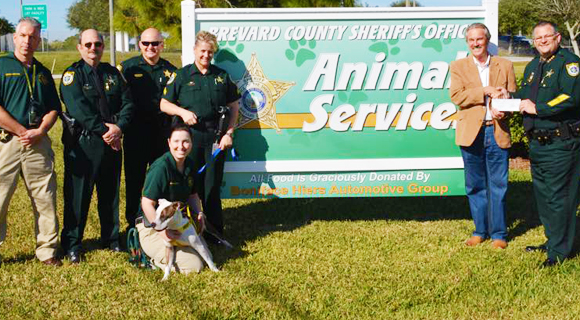Is achieving no-kill possible at an animal care and control facility? How about sustaining it? Brevard County Sheriff’s office in Titusville, FL, proves both are possible, but it didn’t happen overnight. In fact, it took about two years from when Sheriff Ivey and the Brevard County Sheriff’s Office first took over animal services. Here’s what happened.
“There is a misnomer out there that a government maintained shelter can’t reach no-kill status,” said Ivey. “It’s ironic.”
When they first took over in October of 2014, the facility was only saving around 55 percent of the animals. Ivey explained that at the time, the shelters were in shambles, equipment was lacking and in poor condition, there wasn’t a veterinarian on staff, nor did they have many outside resources.
“We were severely failing at protecting the homeless animals in our community,” said Ivey. “When we assumed responsibility we made a commitment – to make Brevard County a more humane community, to raise the standard of care in our shelters, to reunite lost pets with their owners, and to save as many animals as possible through adoptions, fosters, and newly developed innovative programs.”
Despite many thinking they were at a disadvantage, six months after taking over, Sheriff Ivey stood in front of the county commission and announced the bold initiative to achieve no-kill status within two years.
“It was a goal that few people thought was possible, but one that thousands of animals needed us to achieve,” he said.
Fast-forward a year and a half later to October 1, 2016, when Sheriff Ivey proudly held a press conference announcing their no-kill status. It was almost two years to the day since taking control of animal services.
So, how’d they do it? First and foremost, they refused to believe they couldn’t become no-kill.
“Some people are just willing to accept that you’re doing the best you can. But sometimes doing the best you can is not enough,” said Ivey. “You have to do more. You have to work as a team. You have to ask for help. You have to look at the standards and programs that are out there and see what is working.”
In their MaddieTalk How Numbers Can Tell Your Story – and Save Lives!, Ivey shares that their success was driven by a continuous process of collecting and examining their data, and modifying their processes based on what the data dictated. “By adopting that philosophy and maintaining flexibility, I believe that any animal care center or facility can exponentially improve their opportunities to succeed.”
Some examples of the initiatives and processes included: managed intake and mitigation, paws and stripes initiative, daily rounds, initial intake exam, open adoptions, discounted or free adoptions, open selection, community cat diversion program, dog transports, events and more.
There is no single secret to success, says Ivey. “Put together a great team, give them the resources they need, and stay the heck out of their way.”
He continued, “As sheriff, I manage my team by standing around. I stand behind them when they need a kick in the butt, I stand beside them in the trenches, and I stand in front of them when someone is taking a shot at them. Do that for your team and I promise you, they will amaze you with their success.”
When looking into the future of municipal shelters, Ivey hopes that every shelter will be working toward no-kill status. But he cautions that it can’t just be the shelter working toward it. He says you have to have your community’s buy-in, too.
“The local partners, the rescues, the SPCA, and humane society in their area, veterinarians, the volunteers – all of that has to be inclusive,” he said. “There has to be absolute buy-in from the top. Whoever is in that position has to have the drive and the desire to be able to step to the podium one day to say we did it; we made it to no-kill.”
Most importantly, Ivey reminds us that no-kill status can’t be a one-time thing.
“It has to be ‘we got there, we’re committed to staying here and maintaining it.’ Whoever is operationally creating the strategy needs to look long term at being able to sustain that pinnacle of reaching no-kill.”
Watch Brevard County Sheriff’s Office’s MaddieTalk, and learn how you can save more lives today!

